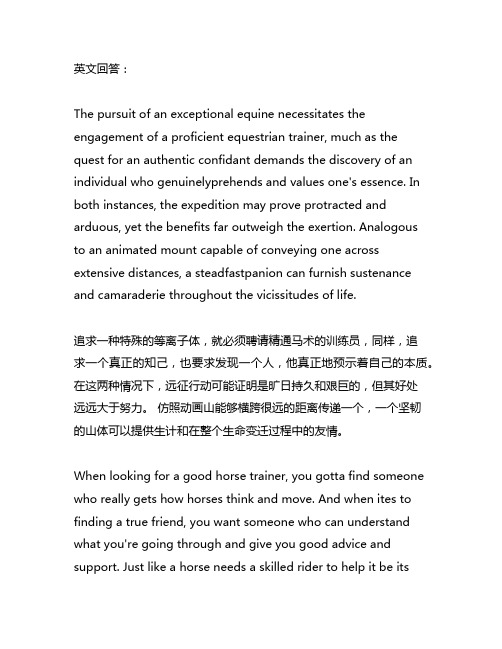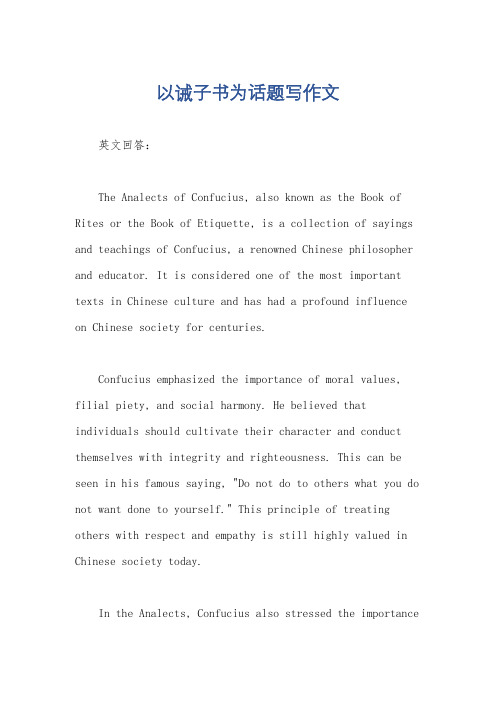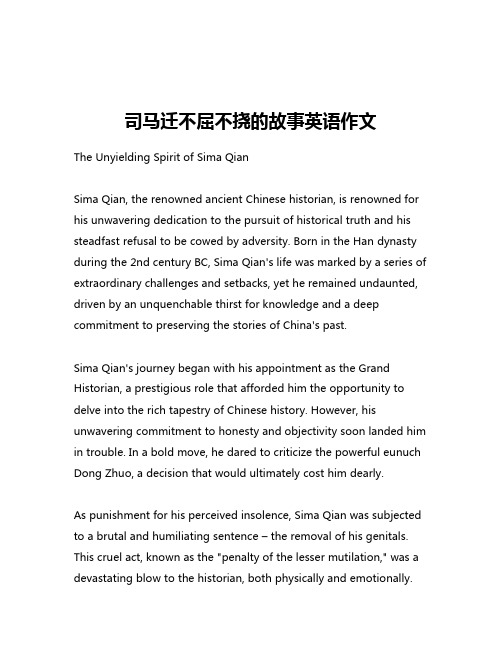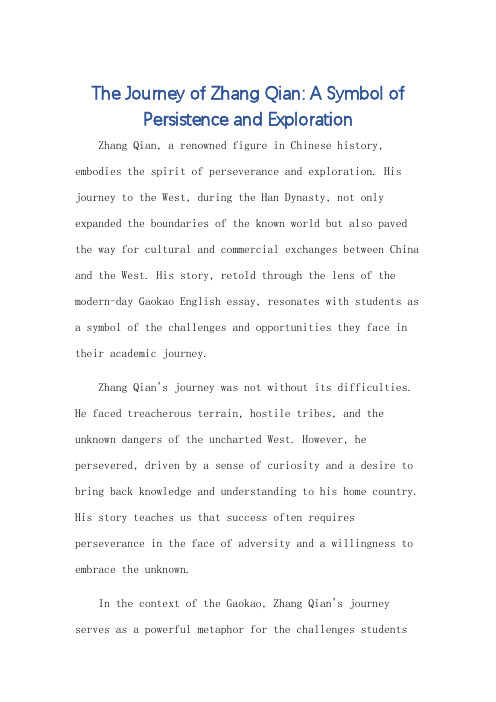英语作文(蹇子骥)
千里骐骥寻伯乐高山流水觅知音作文

英文回答:The pursuit of an exceptional equine necessitates the engagement of a proficient equestrian trainer, much as the quest for an authentic confidant demands the discovery of an individual who genuinelyprehends and values one's essence. In both instances, the expedition may prove protracted and arduous, yet the benefits far outweigh the exertion. Analogousto an animated mount capable of conveying one across extensive distances, a steadfastpanion can furnish sustenance and camaraderie throughout the vicissitudes of life.追求一种特殊的等离子体,就必须聘请精通马术的训练员,同样,追求一个真正的知己,也要求发现一个人,他真正地预示着自己的本质。
在这两种情况下,远征行动可能证明是旷日持久和艰巨的,但其好处远远大于努力。
仿照动画山能够横跨很远的距离传递一个,一个坚韧的山体可以提供生计和在整个生命变迁过程中的友情。
When looking for a good horse trainer, you gotta find someone who really gets how horses think and move. And when ites to finding a true friend, you want someone who can understand what you're going through and give you good advice and support. Just like a horse needs a skilled rider to help it be itsbest, we all need a caring and understanding friend to help us through life's ups and downs.在寻找一个好马教练时,你必须找到一个真正懂得马的思考和动作的人。
以诫子书为话题写作文

以诫子书为话题写作文英文回答:The Analects of Confucius, also known as the Book of Rites or the Book of Etiquette, is a collection of sayings and teachings of Confucius, a renowned Chinese philosopher and educator. It is considered one of the most important texts in Chinese culture and has had a profound influence on Chinese society for centuries.Confucius emphasized the importance of moral values, filial piety, and social harmony. He believed that individuals should cultivate their character and conduct themselves with integrity and righteousness. This can be seen in his famous saying, "Do not do to others what you do not want done to yourself." This principle of treating others with respect and empathy is still highly valued in Chinese society today.In the Analects, Confucius also stressed the importanceof education and self-improvement. He believed that knowledge and learning were essential for personal growth and societal progress. Confucius encouraged his disciples to continuously seek knowledge and to strive for self-improvement. This emphasis on education has had a lasting impact on Chinese culture, where education is highly valued and seen as a means to achieve success and social mobility.Furthermore, Confucius advocated for the importance of social relationships and the proper conduct in different roles and positions. He emphasized the importance of maintaining harmonious relationships within the family, between friends, and in society as a whole. Confucius believed that by fulfilling one's responsibilities and obligations in these relationships, individuals could contribute to a harmonious and stable society.中文回答:《论语》是孔子的一部经典著作,也被称为《礼记》或《仪礼》。
纪渻子养斗鸡的启示英语作文

纪渻子养斗鸡的启示英语作文In the annals of Chinese literature, the parable of Ji Guangzi and his fighting cockerel stands as a timeless allegory, echoing through the centuries with its profound insights into human nature, the nature of competition, and the path to true success.Ji Guangzi, a renowned scholar and philosopher of the Warring States period (475-221 BC), was known for his eccentric ways and unconventional teachings. One day, while strolling through the marketplace, he stumbled upon a young man engaged in a heated argument over a fighting cockerel. The young man was adamant that his bird was invincible, having bested all other challengers in the area. Intrigued, Ji Guangzi approached the young man and inquired about his methods for training such a remarkable creature.The young man proudly explained his rigorous regimen of intense physical conditioning and a specialized diet. He boasted of his secret techniques for sharpening thecockerel's claws and beak. Ji Guangzi listened attentively, his keen eye observing the young man's every move. When the young man had finished his exposition, Ji Guangzi chuckled softly and said, "Young man, you have indeed put mucheffort into preparing your cockerel for battle. But tell me, have you given any thought to the nature of the opponent it will face?"The young man looked at Ji Guangzi in confusion. "What does that matter?" he asked. "My cockerel is the strongestin the area. No opponent can match its prowess."Ji Guangzi shook his head and replied, "You are mistaken, young man. The true nature of an opponent liesnot solely in its physical attributes or combat skills. It lies in its motivations, its desires, and its fears. Ifyour cockerel is driven solely by the instinct to fight, then it will be easy for a more cunning opponent to exploit its weaknesses."The young man scoffed at Ji Guangzi's words. "Cunning? What use is cunning in a battle of strength?"Ji Guangzi smiled patiently and said, "Cunning, young man, is the art of deception. It is the ability to outthink your opponent, to anticipate their moves, and to exploit their weaknesses. A cockerel that relies solely on brute force may be formidable against opponents of equal strength. But when faced with an opponent that is more cunning, itwill be easily defeated."The young man remained unconvinced, but Ji Guangzi's words planted a seed of doubt in his mind. He decided toput Ji Guangzi's theory to the test. He arranged a match between his cockerel and a smaller, less muscular opponent. To his astonishment, the smaller cockerel employed a series of cunning tactics, feinting and dodging, to wear down his larger opponent. In the end, the smaller cockerel emerged victorious.The young man was humbled by the experience. Herealized that Ji Guangzi was right. True success in competition required more than just physical strength or technical skill. It required a deep understanding of one'sopponent and the ability to adapt one's strategy accordingly.The parable of Ji Guangzi and his fighting cockerel is not merely a story about cockfighting. It is a timeless allegory about the nature of competition and the path to true success. In any endeavor, whether it be in business, politics, or personal relationships, true success is achieved not through brute force or cunning alone, but through a combination of both. It requires a deep understanding of one's opponent, the ability to adapt one's strategy, and the wisdom to know when to fight and when to retreat.Just as Ji Guangzi's fighting cockerel was defeated by a smaller, more cunning opponent, so too can our own ambitions be thwarted by those who are more adaptable and more strategic. True success lies not in crushing our opponents, but in outthinking them, anticipating their moves, and exploiting their weaknesses. It lies in understanding the nature of competition and in embracing the principles of adaptability, strategy, and wisdom.。
黔驴技穷的英语作文

黔驴技穷的英语作文When the Mule Reaches Its Limits。
In ancient China, there was a story about a mule named Qian Lu. Qian Lu was an ordinary mule, but the phrase "Qian Lu Ji Qiong" (以黔驴技穷) has become a popular idiom that means "to reach the limit of one's abilities." This story has been passed down through generations and serves as a reminder that everyone has their limitations.Qian Lu was a hardworking mule owned by a poor farmer named Zhang. Zhang relied on Qian Lu to plow his fields and transport goods to the market. Qian Lu was diligent and always gave his best effort, but he had his limitations.One day, Zhang decided to test Qian Lu's abilities. He loaded the mule with a heavy load of goods and asked him to carry it up a steep hill. Qian Lu tried his best, but no matter how hard he pushed, he couldn't move forward. He was exhausted and felt defeated.Zhang realized that Qian Lu had reached his limits. He didn't blame the mule for his inability to carry the load; instead, he felt grateful for Qian Lu's hard work and dedication over the years. Zhang understood that everyone has their limitations, and it was unfair to expect Qian Lu to do something beyond his capabilities.This story teaches us an important lesson about recognizing our own limitations. Just like Qian Lu, we all have our strengths and weaknesses. It is essential to understand our abilities and not push ourselves too hard. We should focus on what we can do well and not be discouraged by what we cannot.In today's society, the pressure to excel and achieve is immense. Many people feel the need to constantly prove themselves and reach new heights. However, it is crucial to remember that everyone has their limits. It is not a sign of weakness to acknowledge these limitations; instead, it shows self-awareness and wisdom.When we reach the limit of our abilities, it is important to seek help and support from others. Just as Zhang didn't blame Qian Lu for his inability to carry the heavy load, we should not be afraid to ask for assistance when needed. Collaboration and teamwork can often help us overcome our limitations and achieve success.Furthermore, understanding our limitations allows us to set realistic goals and expectations for ourselves. Instead of constantly striving for perfection, we can focus on personal growth and improvement. By accepting our limitations, we can lead a more balanced and fulfilling life.In conclusion, the story of Qian Lu teaches us the importance of recognizing our limitations. Just like the mule, we all have our strengths and weaknesses. It is essential to understand our abilities and not push ourselves beyond our limits. By accepting our limitations, seeking help when needed, and setting realistic goals, we can lead a more balanced and fulfilling life. Remember, itis not a sign of weakness to acknowledge our limitations; instead, it shows self-awareness and wisdom.。
司马迁不屈不挠的故事英语作文

司马迁不屈不挠的故事英语作文The Unyielding Spirit of Sima QianSima Qian, the renowned ancient Chinese historian, is renowned for his unwavering dedication to the pursuit of historical truth and his steadfast refusal to be cowed by adversity. Born in the Han dynasty during the 2nd century BC, Sima Qian's life was marked by a series of extraordinary challenges and setbacks, yet he remained undaunted, driven by an unquenchable thirst for knowledge and a deep commitment to preserving the stories of China's past.Sima Qian's journey began with his appointment as the Grand Historian, a prestigious role that afforded him the opportunity to delve into the rich tapestry of Chinese history. However, his unwavering commitment to honesty and objectivity soon landed him in trouble. In a bold move, he dared to criticize the powerful eunuch Dong Zhuo, a decision that would ultimately cost him dearly.As punishment for his perceived insolence, Sima Qian was subjected to a brutal and humiliating sentence – the removal of his genitals. This cruel act, known as the "penalty of the lesser mutilation," was a devastating blow to the historian, both physically and emotionally.Yet, in the face of such adversity, Sima Qian's spirit remained unbroken.Rather than succumbing to despair or abandoning his life's work, Sima Qian channeled his pain and anguish into an even more profound dedication to his craft. He refused to allow his personal tragedy to overshadow the importance of his historical project, and with remarkable resilience, he continued his research and writing.Sima Qian's magnum opus, the Shiji (Records of the Grand Historian), stands as a testament to his unwavering determination. This monumental work, spanning 130 chapters and covering over 2,500 years of Chinese history, is a masterpiece of historiography that has endured the test of time. Through meticulous research, Sima Qian meticulously documented the rise and fall of dynasties, the exploits of legendary figures, and the ebb and flow of Chinese civilization.The Shiji is not merely a dry recitation of historical facts; it is a living, breathing narrative that captures the human drama and the complex interplay of power, ambition, and moral choices that have shaped the course of Chinese history. Sima Qian's writing is characterized by a keen eye for detail, a deep understanding of human nature, and a remarkable ability to weave together disparate strands of information into a cohesive and compelling whole.Despite the personal hardships he faced, Sima Qian remained steadfast in his commitment to the truth. He refused to succumb to the temptation of distorting or embellishing historical events to appease the powerful or to conform to prevailing political agendas. Instead, he strove to present a balanced and impartial account, recognizing the complexities and nuances of historical events.Sima Qian's unwavering dedication to historical accuracy and objectivity has earned him the respect and admiration of scholars and historians throughout the ages. His work has become an invaluable resource for understanding the rich tapestry of Chinese history, and his legacy continues to inspire and influence generations of researchers and writers.The story of Sima Qian's life is a testament to the power of the human spirit to overcome adversity and to pursue knowledge and truth with unwavering determination. His life serves as a shining example of the enduring value of intellectual honesty, the importance of preserving historical memory, and the transformative power of the written word.In the face of personal tragedy and political persecution, Sima Qian's unyielding spirit shines through, reminding us that even in the darkest of times, the pursuit of knowledge and the preservation of truth can be a powerful force for good. His legacy continues toinspire and guide us, encouraging us to strive for the same level of dedication, integrity, and courage that he embodied throughout his remarkable life.。
英语作文 黔驴技穷

英语作文黔驴技穷The Phrase "Qián lǘ jì qióng" (黔驴技穷) is a Chinese idiom that means "a donkey from Guizhou has exhausted all its skills". It is often used to describe a situation where someone has tried everything they know, but still can't solve a problem. In this essay, I will discuss the meaning of this idiom and its relevance in today's world.The origin of this idiom can be traced back to the Warring States period in China. According to legend, there was a donkey from Guizhou that was known for its exceptional skills. It could carry heavy loads, climb steep hills, and even cross rivers. However, one day, the donkey was faced with a task that was beyond its abilities. It had to cross a river that was too wide and deep. Despite its best efforts, the donkey could not find a way to cross the river. It had exhausted all its skills, and there was nothing more it could do.The story of the donkey from Guizhou has become a metaphor for situations where people face challenges that are beyond their abilities. It is a reminder that sometimes, no matter how skilled we are, there are limits to what we can do. It is also a reminder that we should not be afraidto ask for help when we need it.In today's world, the phrase "Qián lǘ jì qióng" is still relevant. We live in a complex and rapidly changing world, where problems can be difficult to solve. Technology has made our lives easier in many ways, but it has also created new challenges. For example, the rise of social media has led to new forms of cyberbullying and harassment. Many people are struggling to find ways to deal with these issues, and some may feel like they have exhausted alltheir options.In such situations, it is important to remember that we are not alone. There are always people who can help us, whether it is a friend, a family member, or a professional. It is also important to keep an open mind and be willing to try new approaches. Sometimes, the solution to a problemmay be something we have never considered before.In conclusion, the phras e "Qián lǘ jì qióng" is a powerful reminder that there are limits to what we can do, and that it is okay to ask for help when we need it. It is a reminder that we should not be afraid to try new approaches and seek out new solutions. By keeping this in mind, we can face the challenges of the modern world with confidence and resilience.。
2023全国甲卷英语作文优秀范文张骞

2023全国甲卷英语作文优秀范文张骞The first time I encountered the story of Zhang Qian was in a history textbook when I was in elementary school. His name was printed in bold characters, accompanied by a portrait depicting him as a man with a solemn expression and wearing traditional Han Chinese attire. Even as a young child, I could sense the weight of his legacy and the significance of his journeys.Zhang Qian was a diplomat and explorer who lived during the Han Dynasty, a pivotal period in Chinese history. In 138 BCE, he was commissioned by Emperor Wu to embark on an ambitious mission –to establish diplomatic and trade relations with the nomadic peoples of Central Asia and beyond. This was no small feat, as the vast expanse of the Eurasian steppe was largely uncharted territory for the Chinese at the time.Zhang Qian's journey was fraught with peril. He encountered hostile tribes, endured harsh climates, and faced capture and imprisonment. Yet, his resilience and determination never faltered. For over a decade, he traversed treacherous terrain, crossing deserts and scaling mountains, all in the pursuit of forging alliances and opening up new trade routes.One of Zhang Qian's most remarkable achievements was his role in establishing the Silk Road, a network of trade routes that connected China with the Roman Empire and other civilizations in the West. This ancient highway facilitated not only the exchange of goods but also the dissemination of ideas, knowledge, and cultural traditions across vast distances.Zhang Qian's journeys were not merely expeditions; they were voyages of discovery that reshaped the world as it was known to the Chinese. His reports provided invaluable insights into the lands, peoples, and customs beyond the borders of the Han Empire. His accounts of the powerful empires of Parthia and Bactria, and the exotic products they traded, kindled a fascination with the Western regions among the Chinese elite.Beyond his practical contributions, Zhang Qian's legacy lies in his embodiment of the indomitable human spirit. His unwavering determination in the face of adversity, his curiosity about the unknown, and his willingness to embrace new cultures and ideas set him apart as a true pioneer. He exemplified the values of courage, perseverance, and open-mindedness that have inspired generations of explorers and adventurers throughout history.As I reflect on Zhang Qian's story, I am struck by the profoundimpact that a single individual's actions can have on the course of human civilization. His journeys not only facilitated trade and cultural exchange but also laid the foundations for greater understanding and cooperation between disparate peoples. In an era where borders and divisions often dominate the headlines, Zhang Qian's legacy serves as a powerful reminder of the transformative potential of bridging gaps and fostering connections.Moreover, Zhang Qian's story resonates with the timeless human desire for knowledge and understanding. His thirst for exploration and discovery transcended the confines of his own era and culture, echoing the universal yearning to unravel the mysteries of the world around us. In that sense, his spirit lives on in the countless individuals who continue to push the boundaries of human knowledge and understanding, driven by an insatiable curiosity and a commitment to expanding the frontiers of human experience.As I pen these words, I am filled with a profound sense of admiration and gratitude for Zhang Qian's remarkable life and achievements. His story reminds us that even in the face of daunting challenges, the human spirit can triumph, and that the pursuit of knowledge and understanding can forge enduring connections across vast divides. In a world that often seems fragmented and divisive, Zhang Qian's legacy stands as a beacon of hope, reminding us of thetransformative power of curiosity, perseverance, and a willingness to embrace the unknown.。
高考英语作文张骞

The Journey of Zhang Qian: A Symbol of Persistence and ExplorationZhang Qian, a renowned figure in Chinese history, embodies the spirit of perseverance and exploration. His journey to the West, during the Han Dynasty, not only expanded the boundaries of the known world but also paved the way for cultural and commercial exchanges between China and the West. His story, retold through the lens of the modern-day Gaokao English essay, resonates with students as a symbol of the challenges and opportunities they face in their academic journey.Zhang Qian's journey was not without its difficulties. He faced treacherous terrain, hostile tribes, and the unknown dangers of the uncharted West. However, he persevered, driven by a sense of curiosity and a desire to bring back knowledge and understanding to his home country. His story teaches us that success often requires perseverance in the face of adversity and a willingness to embrace the unknown.In the context of the Gaokao, Zhang Qian's journey serves as a powerful metaphor for the challenges studentsface. The Gaokao, often referred to as the "Chinese College Entrance Exam," is a critical milestone in the academic careers of Chinese students. It represents a testing ground not only for academic knowledge but also for perseverance, resilience, and the ability to adapt to pressure.Just as Zhang Qian persevered in his journey to the West, students must persevere in their studies, despite the difficulties and pressures they may encounter. They must maintain a sense of curiosity and a desire to learn, just as Zhang Qian did in his quest for knowledge. By doing so, they can overcome the challenges of the Gaokao and embark on their own journey of discovery and growth.Zhang Qian's story also teaches us about the importance of cultural exchange and understanding. His journey to the West not only brought back valuable information about foreign lands but also fostered cultural exchanges between China and the West. Similarly, in the modern era, students must cultivate a global perspective and an appreciation for diverse cultures. By doing so, they can contribute to the global community and promote understanding and harmony among nations.In conclusion, the story of Zhang Qian serves as a powerful inspiration for students facing the challenges of the Gaokao. His perseverance, curiosity, and willingness to embrace the unknown are qualities that students can draw upon in their own academic journey. By embracing these qualities, students can overcome the difficulties of the Gaokao and embark on a journey of discovery and growth that will prepare them for the challenges and opportunities of the future.**张骞的旅程:坚持与探索的象征**张骞,这位在中国历史上赫赫有名的人物,体现了坚持与探索的精神。
- 1、下载文档前请自行甄别文档内容的完整性,平台不提供额外的编辑、内容补充、找答案等附加服务。
- 2、"仅部分预览"的文档,不可在线预览部分如存在完整性等问题,可反馈申请退款(可完整预览的文档不适用该条件!)。
- 3、如文档侵犯您的权益,请联系客服反馈,我们会尽快为您处理(人工客服工作时间:9:00-18:30)。
Book - I lifelong friends
Gorky said: "the book is the ladder of human progress." To this, I deeply impressed that. I also like reading, and in every age group will see many different kinds of books. Just as the golgi said "ladder", different stage see of book, for me now is the formation of the rich knowledge of contribution.
I see the beginning of the book is known as "WaWaShu" little picture album, which although some scientific knowledge, but gradually, it can't satisfy my desire for knowledge. Then and mom bought me a lot of popular science books, such as "hundred thousand whys", "five thousand years or" and so on, I see more with relish, some knowledge can also carry out! Later, my mother bought me the ShenShiXi animal stories ", in the novel the story of the animals and people, often make me be very worried about. Recently, my mother gave me to buy the terrible math "series, for I open a door for magic of mathematical gate.
Each book for helping me also is different. Literature books, such as the book old story of south and the ShenShiXi animal stories "and so on, the story in the book appetizing for my cup of tea, I was attracted to the protagonist's vicissitudes of life, sometimes cheerful, sometimes sad, let me know how the man's beauty and ugliness good and evil. And popular science books is like a teacher to me as to impart knowledge, such as "terrible math" and "the earth's story, they let me to have a further understanding of scientific knowledge, help me to become king of knowledge. Of course there are pictures, such as "chongqing scenery", let I don't have to chongqing through mountains and rivers, you can make the beauty of the chongqing panoramic view.
People often say: "reading enriches the mind!" A book is the human life friends, but also human nourishment for the mind. Therefore, we should be like bing xin old man said that: "good reading, read more books, read good books.。
